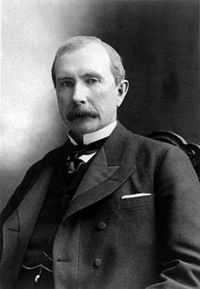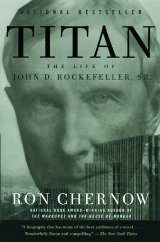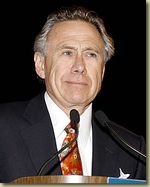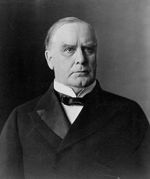Think of this as Volume 16, Number 27 of A-Clue.com, the online newsletter I've written since 1997. Enjoy.

In other words, we're playing the 1900 game.
As was true at the dawn of the progressive era, today's political argument is over a new economic order. The difference is that the rising tide of that era – mass production, scaled energy – is the falling tide of our time.
Of course that's not the way the other side sees it.
Oil's view is that the entire 20th century consisted of an insane set of mistakes, and their goal is to move us back to the “glory days” of the 1880s, a time when things like regulation, the social safety net, and government of the people rather than the oil-a-garchs had yet to be born.
Back when this guy was the face of American business. (To see him again, click for more.)

As Ron Chernow wrote in his Rockefeller biography, “Titan,” the 1880s were not an era of free enterprise. Trusts like Standard Oil organized industries so they could scale and control markets. The alternative, as was learned as early as the 1860s, was a “market” of boom-and-bust, of small producers cutting one anothers' throats, and no one able to create efficiency.
This was true throughout the economy. The alternative to organizing industries under central control was local monopolies choking farmers and manufacturers from growth, and wild swings between euphoria and bust that kept anyone from getting ahead.
We are seeing this right now.

Of course, reality does not enter into politics. And, as I noted, we're playing the 1900 Game. Obama isn't Nixon. He's William McKinley.
The political differences between today and 1900, for the oil industry, is that back then bought politicians didn't stay bought – the “trust busters” who broke up Standard Oil were big recipients of Standards' campaign contributions – and the industry felt powerless to control popular opinion against the new industries of muckraking newspapers and magazines. PR hadn't been invented yet.

The belief, on Wall Street, K Street and in oil industry boardrooms, is that “the people” can be made to believe anything, that they can be led like sheep into rejecting all the protections against feudalism created since John D. Rockefeller rocked a moustache. (Don't believe me? Read any set of comments about the Affordable Care Act.)
The ultimate check against submitting to law and order, ironically created by the Internet itself, lies in the ability to move money to wherever oligarchs can get the best deal. Sheldon Adelson makes his money in China yet thinks he can tell us who will be our President. It's as though America is just Ohio, and its politicians were being bought-and-sold in New York. Which is what Rockefeller was up to in 1900.

Then again, the muckrakers didn't like McKinley, either.










